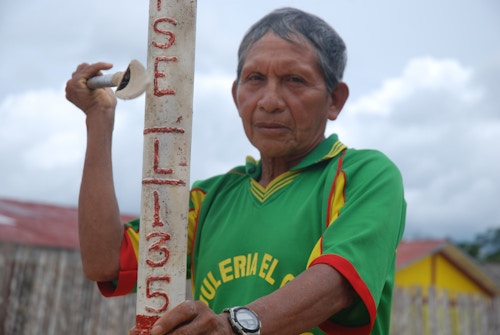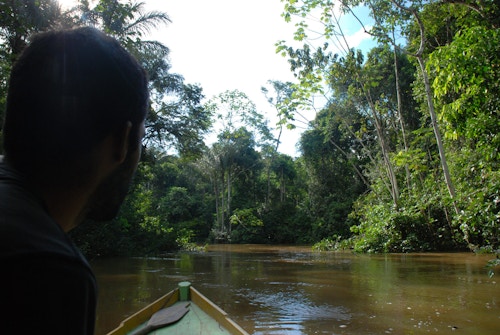Protection for uncontacted indigenous groups in key Peruvian rainforest secured
Peruvian indigenous organization ORPIO and global partners celebrate a major win as the largest indigenous reserve ever in the country is finally approved. Existing logging concessions will be removed and uncontacted indigenous groups protected.

Aerial view of the Yavari-Tapiche, home to many indigenous peoples in voluntary isolation. Photo: Armando Lamadrid/Rainforest Foundation Norway
Peru's president signed a decree establishing the Yavari-Tapiche Isolated Indigenous Peoples' Reserve in Loreto on the Peru-Brazil border in mid-April. About a quarter the size of Denmark, the area is one of the world's most species-rich and intact rainforest areas in the world.
The establishment of the reserve is a massive victory for indigenous peoples' rights, the uncontacted indigenous peoples living there, and for our planet. Rainforest Foundation Norway (RFN) has fought to establish the Yavari-Tapiche reserve for nearly two decades.
Removal of logging concessions
The establishment of the reserve means that all the 16 logging concessions previously issued here have to be removed and relocated. It also implements mechanisms to protect the territory.
With the reserve, covering an area of a million hectares- or 11,000 square kilometers - of pristine rainforest, the many uncontacted indigenous groups there can live without threats from oil and timber companies. Indigenous peoples such as Matses, Remo Auca and other unidentified isolated indigenous groups call this forest their home.
"The establishment of the Yavari-Tapiche reserve is a major victory for the protection of isolated indigenous peoples in Peru," says Anders Krogh, special advisor to Rainforest Foundation Norway. "It is the largest Indigenous reserve ever to be approved in the country. It represents a symbolically important end to an 18 year-long period of political unwillingness to establish such reserves. Uncontacted tribes are among the most vulnerable people on the planet, and the Yavari-Tapiche reserve is located in an area known to be to home the largest concentration of such tribes today.»
- It's been a long, hard fight, says Rainforest Foundation Norway's adviser Anders Krogh. But it is victories like this one that gives us hope that fighting for the rainforest and the people who live there is worthwhile. Now, after 18 years, it's finally paid off.
Indigenous jubilation- and caution
Jorge Pérez Rubio is the president of the main indigenous organization in the Loreto region, ORPIO, RFN's main partner in the area. He underscores the urgency of the establishment of the reserve.
"The establishment of the Yavari-Tapiche is a great achievement and the culmination of almost two decades of struggle. We will now focus on the implementation through the participatory design of the protection plan in coordination with the ministry of culture. We thank RFN for the support provided through all these years. It's been key to exerting political influence at the local, regional and national levels for the creation of the Yavari-Tapiche reserve and the other reserves that remain pending."
Prominent Peruvian specialist on isolated peoples and RFN consultant Beatriz Huertas is also relieved but has some words of caution.
"It is now crucial that the Peruvian government implement the bill. Legal security and territorial protection are fundamental conditions for the survival of indigenous peoples in voluntary isolation. External presence and pressures such as logging endanger the very existence of the isolated peoples," Huertas says.

Photo: David Hill

Photo: David Hill

Photo: David Hill

Photo: David Hill

Photo: David Hill

Photo: David Hill
Hope for the future, but new fights ahead
"This approval could not have come a day later," says Anders Krogh at Rainforest Foundation Norway. "The coronavirus, together with our more common viruses, poses a deadly threat to entire villages, a tragedy that we have seen unfolding in other parts of the world when missionaries, loggers and others invade or contact members of these communities. We are now hopeful that this will not happen in Yavari-Tapiche."
Six other proposed reserves, also supported by RFN, are still awaiting final approval. RFN's partners have recently filed a precautionary measure and petition in the Inter-American Commission for Human Rights against the Peruvian state for failing to comply with its legal obligation of establishing these reserves and protecting isolated indigenous peoples' right to life and traditional territory.
RFN's history in the Yavari- Tapiche
- Rainforest Foundation Norway has since 2004 provided financial support to our local partner ORPIO, and previously to AIDESEP, for the protection of isolated indigenous communities in Peru.
- RFN has collaborated closely with the anthropologist Beatriz Huertas and the rights organization IDL. This support has enabled the documentation of the existence of isolated IPs in the reserve area, preparation of the reserve request, advocacy and media work in Peru for the establishment of the reserve, legal proposals for the protection of isolated IPs, and court cases (IDL) against the government for not complying with due process to establish the reserve, as well as approving overlapping logging concessions.
- The support has included field research and documentation of the existence of the isolated Indigenous peoples, advocacy, legal actions and media campaigns.
